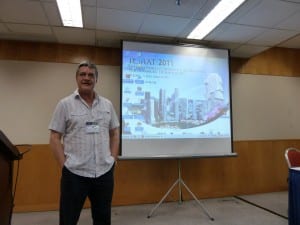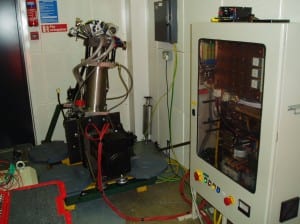International Conference on Materials for Advanced Technologies 26 June – 1 July 2011, SUNTEC, Singapore
Session Code J12.2 – Nanoscale Characterization
Session Chair(s) Jinchong Xiao Paper Details: J12.2-1
Topography of Features Machined Into Bisphenol A Polycarbonate Using Closed Thick Film Flowing Filtered Water Immersed KrF Excimer Laser Ablation
Colin DOWDING1, Jonathan LAWRENCE1, Paul STEWART2#+
1Faculty of Engineering, University of Lincoln, United Kingdom,
2School of Engineering, University of Lincoln, United Kingdom
Presentation Mode: Oral Date/Time Slot: Fri – 1 Jul 11 / 14:00 – 16:00 Presentation Room: 309 Presentation Length: 15 minutes Presentation Order: 1st in the timeslot
Session Code AA8 – Sensing / Probes
Session Chair(s) Vladimir Korzh Paper Details: AA8-2 (Invited)
Looking for Clues – Solving Complex Problems with Biologically Inspired Heuristics
Paul STEWART1#+, Jun CHEN1, David FERNIG2
1School of Engineering, University of Lincoln, United Kingdom,
2University of Liverpool, United Kingdom
Presentation Mode: Oral Date/Time Slot: Thu – 30 Jun 11 / 16:30 – 18:00 Presentation Room: 320 Presentation Length: 30 minutes Presentation Order: 2nd in the timeslot
Session Code AA3 – Photothermal Microscopy
Session Chair(s) Guo Hong Chen
Paper Details: AA3-2 Heparan Sulfate Determines the Modes of Diffusion of Fibroblast Growth Factor2 within the Pericellular Matrix
Laurence DUCHESNE1, Vivien OCTEAU2, Rachel BEARON3, Paul STEWART4, Jun CHEN5, Ian PRIOR6, Alison BECKETT6, Brahim LOUNIS2, David FERNIG7#+
1Institut du Fer à Moulin, UMR-S 839 INSERM, University Pierre and Marie Curie, France,
2University of Bordeaux, France,
3Mathematical Sciences, University of Liverpool, United Kingdom,
4School of Engineering, University of Lincoln, United Kingdom,
5Department of Engineering, University of Lincoln, United Kingdom,
6Physiological Laboratory, University of Liverpool, United Kingdom,
7Structural and Chemical biology, University of Liverpool, United Kingdom
Presentation Mode: Oral Date/Time Slot: Mon – 27 Jun 11 / 16:30 – 18:00 Presentation Room: 320 Presentation Length: 15 minutes Presentation Order: 2nd in the timeslot




